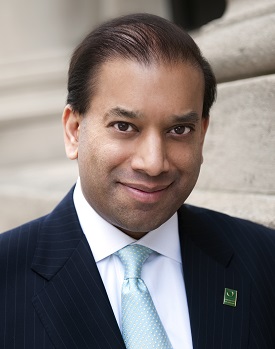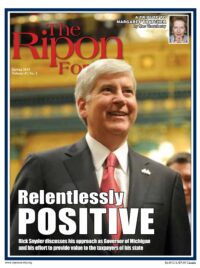
When I moved to Detroit three years ago, one of the most frequent questions asked was if I planned to run an aggressive marketing campaign to “sell” the Detroit region. I felt then, as I do today, that the best way to fix Detroit’s public relations problem was to fix Detroit’s problems. Fortunately, there has been real and meaningful progress in fixing Detroit’s problems – led primarily by a Republican governor and an engaged private sector with strong partnership from philanthropy.
Michigan needs Detroit. It’s that simple. While there are vocal critics of Governor Rick Snyder’s decision to appoint an emergency manager, there is no denying the fact that the future prosperity of Michigan depends in large part on the Motor City. There is no such thing as a growing, prosperous economic region without a strong vibrant urban core and healthy suburbs. While the Detroit region has some of the best suburban areas in the nation, the health of Detroit has been an impediment to more robust economic growth.
While there are vocal critics of Governor Rick Snyder’s decision to appoint an emergency manager, there is no denying the fact that the future prosperity of Michigan depends in large part on the Motor City.
From a business perspective, the declaration of a financial emergency and the naming of Kevyn Orr as emergency manager was overdue. My message to Governor Snyder in regard to the emergency manager was simple: “Bring it on.” With tremendous private sector growth underway in Detroit, the city’s economic uncertainty and instability stands as the final barrier to robust sustained economic growth.
Detroit is a tale of two cities. One with a thriving private sector and another with neighborhoods that bear the scars of unemployment and depopulation. A city challenged to provide basic services to many of its residents. It became clear to the business community that the bold step of an emergency manager was necessary to move the city, region and state forward.
The momentum in Detroit is remarkable. Consider that about $10 billion has been invested in commercial, industrial and residential properties in the city in the past five years. Detroit remains one of the fastest growing regions for technology jobs in the U.S., its signature auto industry is thriving, and approximately 97 percent of downtown Detroit’s rental apartments are occupied while the fastest growing demographic in the city is young professionals with a bachelor’s degree.
Yet, all this progress is occurring with the city’s finances in crisis. The city faces a reported long-term debt of $14 billion and a serious short-term cash shortfall with an annual budget deficit approaching $100 million. The juxtaposition of Detroit’s emerging strengths with its long-term fiscal crisis begs one to wonder about the immense potential of Detroit if it gets its fiscal house in order. Investors from Wall Street to Shanghai are watching with interest and wondering if the Motor City has finally stepped toward fiscal solvency.
Unfortunately, recent efforts by the city council to address the situation did not offer the long-term solutions to put the city on a fiscally sound path. To be fair to the Mayor and city council, they were working to tackle structural problems that stretch back decades. While Mayor Dave Bing made progress and restored integrity to City Hall and brought transparency and ethics to city government, he and the city council were not able to agree on necessary long-term reforms.
As an emergency manager, Orr has the power to make the swift decisions that eluded existing city government. With the powers granted to him under Michigan law, he will be better suited to navigate the some 48 agreements the city has with unions and reform city government processes and structures without having to play political games.
An emergency manager is a prudent step before considering municipal bankruptcy, which would be unchartered territory for a city of this size with potential consequences to regional assets.
An emergency manager is a prudent step before considering municipal bankruptcy, which would be unchartered territory for a city of this size with potential consequences to regional assets. An emergency manager in Detroit also staves off the slash and burn approach typically associated with municipal bankruptcy. The emergency manager has to answer to the Governor, so the person restructuring Detroit’s finances is held accountable by a duly elected official. That’s not the case when dealing with a bankruptcy judge. Orr can approach the fiscal crisis with the city’s long-term future in mind. The goal here is to fix the problems. Having an emergency manager is the best option available at this point.
From a political standpoint, Governor Snyder has little to gain by aggressively tackling Detroit’s problems. The fruits of this heavy lift will likely not become apparent until after his 2014 reelection battle is a distant memory. Furthermore, even as Detroit grows more stable and prosperous, it is not likely to be a target rich opportunity for Republicans anytime soon.
But that is not what’s driving our Governor. True to his background as a businessman and his training as a CPA, Rick Snyder is doing what he thinks will work without regard for the electoral consequences. In doing so, he is providing us with an example of what a public servant should be – a person doing his or her best to do the right thing for the right reason.
That’s what bold leadership is all about. It’s also the type of leadership that is needed to save Detroit.
Sandy K. Baruah is the President & CEO of the Detroit Regional Chamber and previously served as the Assistant Secretary of Commerce for Economic Development and the head of the Small Business Administration under President George W. Bush.




